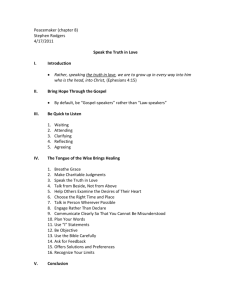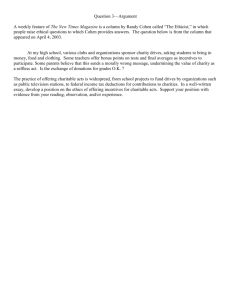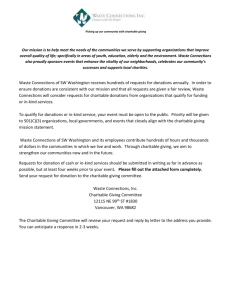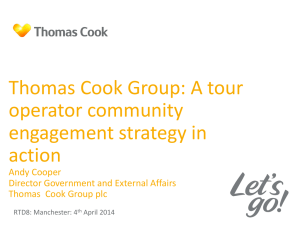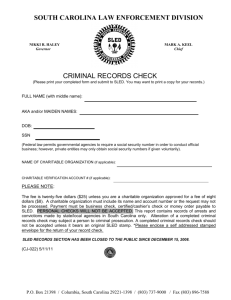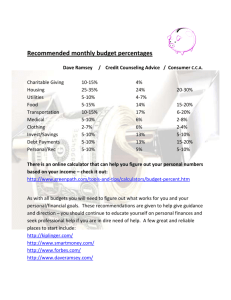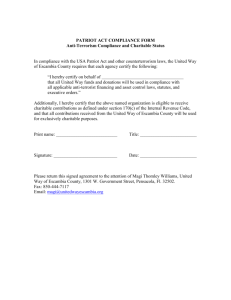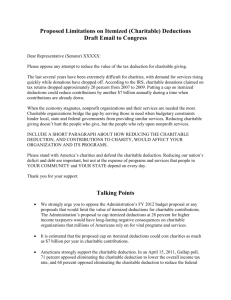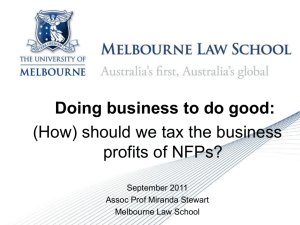Minutes of the Executive Committee meeting held on
advertisement
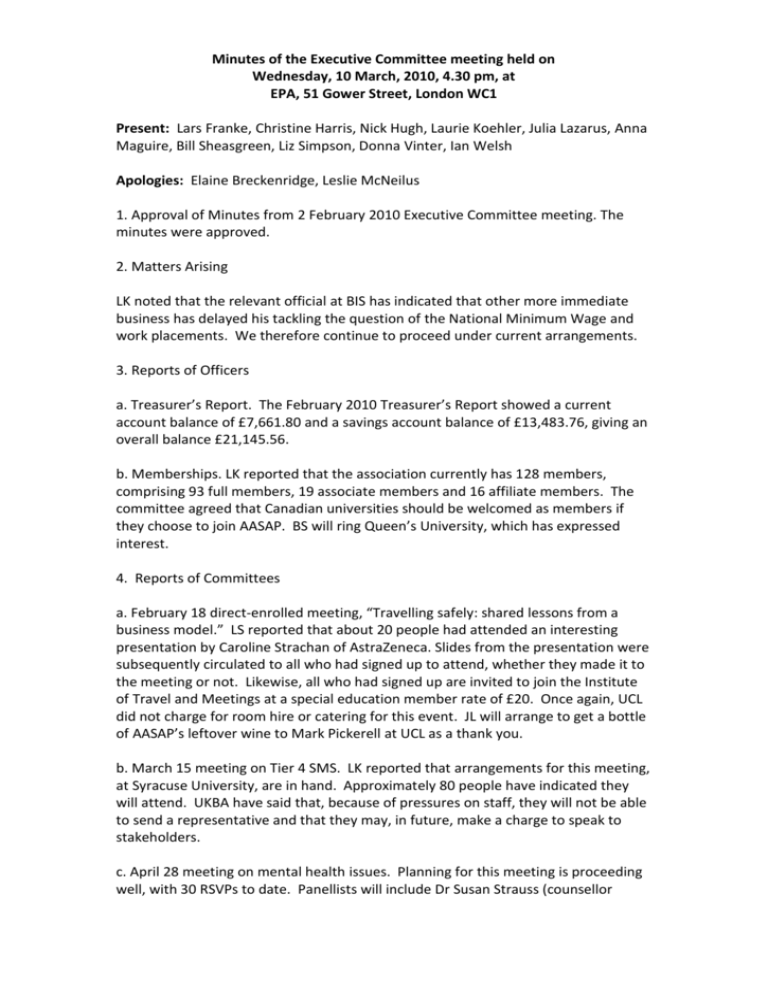
Minutes of the Executive Committee meeting held on Wednesday, 10 March, 2010, 4.30 pm, at EPA, 51 Gower Street, London WC1 Present: Lars Franke, Christine Harris, Nick Hugh, Laurie Koehler, Julia Lazarus, Anna Maguire, Bill Sheasgreen, Liz Simpson, Donna Vinter, Ian Welsh Apologies: Elaine Breckenridge, Leslie McNeilus 1. Approval of Minutes from 2 February 2010 Executive Committee meeting. The minutes were approved. 2. Matters Arising LK noted that the relevant official at BIS has indicated that other more immediate business has delayed his tackling the question of the National Minimum Wage and work placements. We therefore continue to proceed under current arrangements. 3. Reports of Officers a. Treasurer’s Report. The February 2010 Treasurer’s Report showed a current account balance of £7,661.80 and a savings account balance of £13,483.76, giving an overall balance £21,145.56. b. Memberships. LK reported that the association currently has 128 members, comprising 93 full members, 19 associate members and 16 affiliate members. The committee agreed that Canadian universities should be welcomed as members if they choose to join AASAP. BS will ring Queen’s University, which has expressed interest. 4. Reports of Committees a. February 18 direct-enrolled meeting, “Travelling safely: shared lessons from a business model.” LS reported that about 20 people had attended an interesting presentation by Caroline Strachan of AstraZeneca. Slides from the presentation were subsequently circulated to all who had signed up to attend, whether they made it to the meeting or not. Likewise, all who had signed up are invited to join the Institute of Travel and Meetings at a special education member rate of £20. Once again, UCL did not charge for room hire or catering for this event. JL will arrange to get a bottle of AASAP’s leftover wine to Mark Pickerell at UCL as a thank you. b. March 15 meeting on Tier 4 SMS. LK reported that arrangements for this meeting, at Syracuse University, are in hand. Approximately 80 people have indicated they will attend. UKBA have said that, because of pressures on staff, they will not be able to send a representative and that they may, in future, make a charge to speak to stakeholders. c. April 28 meeting on mental health issues. Planning for this meeting is proceeding well, with 30 RSVPs to date. Panellists will include Dr Susan Strauss (counsellor working with NYU and formerly based at Syracuse University), Donna Billington (counsellor working with IES and Ithaca College), Dr Deborah Hill (counsellor working with Lawrence University) and Dr Kenneth Demsky (counsellor working with FSU). d. Cultural visit to the British Music Experience at O2. NH reported that this visit, to consist of a presentation and tour of the site, has now been arranged for Wednesday, May 12th from 4.30 to 6 pm. No costs are involved for AASAP. He will put together an announcement to be posted on the website. e. Cooperation with other European study abroad associations. The committee circulated a report on their deliberations to date. Their recommendations are for a staggered process of fostering a European network, beginning with inviting heads of various European organisations to our AGM as well as to the AASAP/UK 20-year anniversary celebration. A conference call among national association chairs, perhaps leading to a Europe-wide seminar, was also suggested. The executive welcomed these ideas and agreed that a realistic immediate gaol is for a lean model of cooperation that could facilitate the exchange of ideas, the addressing of mutual concerns and the provision of mutual support among European study abroad associations. They likewise welcomed the suggestion that sponsorship for such cooperation might be sought from organisations such as OSAC or the Erasmus Programme. The committee will now research the names of contacts in known European study abroad associations, as well as whether such associations currently exist in other European countries, especially Greece and Germany. LS said that the committee will email the entire executive about their next meeting in case anyone else wants to join. h. Membership survey. LK reported that to date there had been responses from 24 members to Part 1 and 23 members to Part 2 of the survey. Substantive discussion was deferred until after the March 29th deadline for responses. LK will send out an email on March 15th, and another shortly before the final deadline, to remind AASAP members to respond to the survey. On the question of increasing membership fees, LF suggested it would be useful to estimate how much income AASAP needs from fees in order to meet anticipated future expenditure on immigration advice, potential European cooperation, etc. 5. Unfinished Business a. New contractual arrangements with immigration adviser. LK reported that the immigration adviser has agreed to revised contractual arrangements from 31 March, whereby he will charge AASAP £100 per hour for his work, with a minimum per month of £250 and a maximum of £500. The new contract has been posted to him for his signature. b. Forward planning for 2010 AGM. Brian Whalen of FORUM has agreed to be our afternoon guest speaker at the AGM, now confirmed for Friday, 8 October. Acorn has offered to provide, gratis, up to three nights accommodation for him in a studio flat. LK will send Brian Whalen a formal letter of invitation, also seeking information about the precise dates he will be in London. JL will contact Syracuse University to ask if the AGM can be held there. c. Meeting on Facilities and Risk Management, Fall 2010. Although unable to attend the executive committee meeting, EB had emailed information to all about plans now in place for this meeting at the University of Notre Dame on Wednesday, 17 November. Facilities managers Steve Whitnall of Notre Dame and Philip Goodge of IES residence, will jointly conduct this session on health and safety. Featuring a presentation from the British Safety Council, it will cover the basics of British legal requirements for health and safety in the workplace, including first aid, fire safety and risk assessments. d. AASAP anniversary celebration, 2011. LK has written to Louis Susman, the US Ambassador in London, to request that he host a reception at Winfield House in early May 2011. Though she has not yet had a formal response, she has had informal word that her request is being dealt with. e. Charitable status for AASAP. AM circulated a written report on her research into the question of whether charitable status is necessary and/or desirable for AASAP. It appears to be a legal requirement either that we register as a charity or that we pay corporation tax if our income is over £5,000. IW sketched out some of the formal requirements for applying for and maintaining charitable status. AASAP would need to define its charitable purposes, including the public benefit it offers (according to defined criteria of what constitutes public benefit) and make a yearly report on how it has fulfilled its charitable aims. DV pointed out that from late spring 2010 it should be possible to apply for a new kind of charitable status, the Charitable Incorporated Organisation (CIO). While offering the advantages of a corporate structure such as reduced risk of personal liability, CIOs need only register with the Charity Commission rather than also with Companies House. Advantages of CIO status over the existing structure of ‘charitable company limited by guarantee’ thus include less onerous requirements for preparing accounts and annual reports, and lower costs. There was further discussion of whether it would be in AASAP’s interests to seek charitable status, with LK pointing out the extra administrative burden of doing so and that the tax liability would not be so substantial if we chose simply to pay corporation tax. To take the matter forward, AM will consult our independent examiner on the advantages and disadvantages of seeking charitable status, and also on whether we presently have liability for back taxes. She will report to the next executive committee meeting. f. Simon Act status. BS reported that he had been able to track the Simon Act, which passed the House of Representatives by 237-187 votes on 10 June 2009, as far as the Senate Foreign Relations sub-committee on 22 June 2009. It appears to be dormant there. He will make further inquiries about whether there is any expectation it will go forward in this Congress or be reintroduced in the 112 th Congress, when AASAP could add its name to the list of those endorsing it. In the meantime, he has signed up to the FACEBOOK support and information group for the Simon Act. 6. Any Other Business NH and JL reported on the first informal, drop-in coffee morning they had arranged of an internship coordinators’ support group. It had been attended by six people all of whom found it very useful. They will try to hold similar sessions in the future, either monthly or bimonthly. The executive agreed that a social event should be organised for June, either at Truckles or in a garden setting, possibly the garden to 51 Gower Street. LS & AM will take charge of the planning. 7. Date, time and location of next meeting. This will take place on Wednesday, 21 April in the EPA office, 51 Gower St, WC1, at 4.30 pm. The meeting ended at 6.10 pm.

